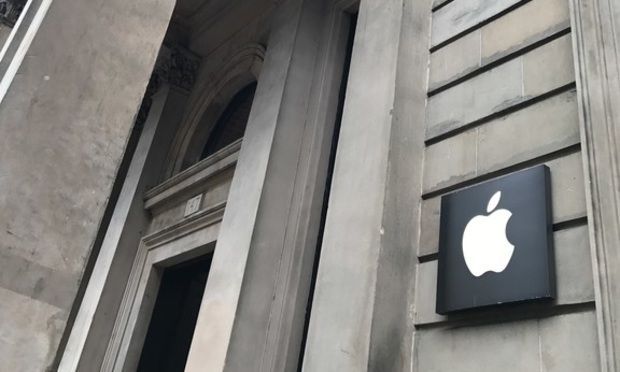Trump Administration Backs Apple in Supreme Court Antitrust Suit Over Apps
"The importance of the question presented will only grow as commerce continues to move online," the U.S. Department of Justice told the Supreme Court in an amicus brief backing Apple Inc.'s position in a closely watched antitrust case.
May 09, 2018 at 04:47 PM
5 minute read
The original version of this story was published on National Law Journal
 An Apple store. Credit: Mike Scarcella
An Apple store. Credit: Mike Scarcella The Trump administration's U.S. Department of Justice is urging the U.S. Supreme Court to reverse a federal appellate court decision that would allow an antitrust class action to go forward against Apple Inc., exposing the company to treble damages for its alleged monopoly of the market for iPhone apps.
U.S. Solicitor General Noel Francisco, in an amicus brief, said the U.S. Court of Appeals for the Ninth Circuit misapplied a 40-year-old Supreme Court decision when it held last year that Apple was a distributor of iPhone apps, selling them directly to purchasers through its App Store. The Justice Department filed its brief at the invitation of the justices for the government's views in the case Apple v. Pepper.
Francisco warned that how courts view Apple's app business model—an agency or consignment sales model—”will significantly affect” private enforcement of federal antitrust law “because other existing and emerging e-commerce platforms use similar models.”
In urging the justices to grant review and reverse the Ninth Circuit, the Justice Department wrote:
“The importance of the question presented will only grow as commerce continues to move online. The Ninth Circuit is home to a disproportionate share of the nation's e-commerce companies, and its erroneous decision creates uncertainty and a lack of uniformity about the proper application of Section 4 to this increasingly common business model. This court should grant certiorari and correct the Ninth Circuit's error.”
The high court case stems from an antitrust class action brought under the Sherman Act on behalf of those who purchased software applications from Apple's online store for use of their iPhones from Dec. 29, 2007, to the present. The consumer class claims that Apple illegally monopolized the distribution of iPhone apps, and that the commissions charged to app developers inflate the prices consumers ultimately pay for apps.
At the center of the case is Apple's method of connecting app developers to those who purchase the apps.
After the launch of the iPhone, Apple created the App Store, an electronic portal through which consumers could buy and download apps. Apple earns 30 percent of every third-party app sold through its store and the app developer retains 70 percent. Payment for an app goes to the App Store which, in turn, credits the developer with the 70 percent share.
In the 1977 case Illinois Brick v. Illinois, the Supreme Court ruled that consumer antitrust lawsuits could be brought only against the party that represents the final point of sale of the good or service in question. Plaintiffs cannot state a claim for treble damages, according to the Supreme Court, by relying on a “pass-on theory”—where a defendant unlawfully overcharged a third party and the third party passed on all or part of the overcharge to the plaintiff.
Purchasers of apps are “indirect” purchasers, according to Francisco. “To prove damages, respondents would need to establish the extent to which Apple's allegedly unlawful practices have caused developers to set higher prices for their apps than they otherwise would have,” argued Francisco. “That is precisely the pass-on inquiry this court has disapproved.”
Latham & Watkins partner Daniel Wall, representing Apple, argued the Ninth Circuit “has approached this case as if all commerce fits the traditional resale distribution model, where the party who delivers goods is also the party who sets the price the consumer pays. But increasingly this is a world of electronic commerce based on electronic marketplaces that—like Apple's App Store—are structured around an agency or consignment sales model where the marketplace sponsor has nothing to do with the pricing of the goods it sells.”
Wall cited as examples of agency-based electronic marketplaces StubHub, eBay, Google Play marketplace, Amazon.com Inc.'s “Amazon Marketplace” business and Facebook's “Marketplace.”
Representing Robert Pepper and the consumer class, Mark Rifkin of New York's Wolf Haldenstein Adler Freeman & Herz, wrote in opposition to review that Apple is not seeking to correct a misapplication of Illinois Brick but to change the law.
“The price paid by purchasers for an app is the amount set by the apps developer, plus Apple's own supra-competitive 30 percent markup, both of which are paid directly to Apple, the alleged monopolist, every time an app is purchased,” Rifkin told the justices. He added: “The apps developers do not sell their apps to iPhone customers or collect any payment from iPhone customers, and iPhone customers are the only purchasers in the entire chain of distribution. Respondents seek damages based solely on the 30 percent markup.”
Apple, Rifkin argued, wants the justices to “jettison the straightforward direct purchaser requirement of Illinois Brick and replace it with a new 'antecedent transaction' analysis, an approach to antitrust standing that finds no support in this court's precedent, would invite the same factual complications and speculation on damages that the bright-line standing test of Illinois Brick seeks to avoid, and would often leave nobody with standing to sue a monopolist (as would be the case here).”
The Washington Legal Foundation and the App Association have filed amicus briefs supporting Apple's petition for review.
This content has been archived. It is available through our partners, LexisNexis® and Bloomberg Law.
To view this content, please continue to their sites.
Not a Lexis Subscriber?
Subscribe Now
Not a Bloomberg Law Subscriber?
Subscribe Now
NOT FOR REPRINT
© 2025 ALM Global, LLC, All Rights Reserved. Request academic re-use from www.copyright.com. All other uses, submit a request to [email protected]. For more information visit Asset & Logo Licensing.
You Might Like
View All
Growth of California Firms Exceeded Expectations, Survey of Managing Partners Says
5 minute read
Google Makes Appeal to Overturn Jury Verdict Branding the Play Store as an Illegal Monopoly
5 minute read
Eight Years On, A&O Shearman’s Fuse Legal Tech Incubator Is Still Evolving
4 minute read
Chicago Law Requiring Women, Minority Ownership Stake in Casinos Is Unconstitutional, New Suit Claims
5 minute readTrending Stories
- 1Rejuvenation of a Sharp Employer Non-Compete Tool: Delaware Supreme Court Reinvigorates the Employee Choice Doctrine
- 2Mastering Litigation in New York’s Commercial Division Part V, Leave It to the Experts: Expert Discovery in the New York Commercial Division
- 3GOP-Led SEC Tightens Control Over Enforcement Investigations, Lawyers Say
- 4Transgender Care Fight Targets More Adults as Georgia, Other States Weigh Laws
- 5Roundup Special Master's Report Recommends Lead Counsel Get $0 in Common Benefit Fees
Who Got The Work
J. Brugh Lower of Gibbons has entered an appearance for industrial equipment supplier Devco Corporation in a pending trademark infringement lawsuit. The suit, accusing the defendant of selling knock-off Graco products, was filed Dec. 18 in New Jersey District Court by Rivkin Radler on behalf of Graco Inc. and Graco Minnesota. The case, assigned to U.S. District Judge Zahid N. Quraishi, is 3:24-cv-11294, Graco Inc. et al v. Devco Corporation.
Who Got The Work
Rebecca Maller-Stein and Kent A. Yalowitz of Arnold & Porter Kaye Scholer have entered their appearances for Hanaco Venture Capital and its executives, Lior Prosor and David Frankel, in a pending securities lawsuit. The action, filed on Dec. 24 in New York Southern District Court by Zell, Aron & Co. on behalf of Goldeneye Advisors, accuses the defendants of negligently and fraudulently managing the plaintiff's $1 million investment. The case, assigned to U.S. District Judge Vernon S. Broderick, is 1:24-cv-09918, Goldeneye Advisors, LLC v. Hanaco Venture Capital, Ltd. et al.
Who Got The Work
Attorneys from A&O Shearman has stepped in as defense counsel for Toronto-Dominion Bank and other defendants in a pending securities class action. The suit, filed Dec. 11 in New York Southern District Court by Bleichmar Fonti & Auld, accuses the defendants of concealing the bank's 'pervasive' deficiencies in regards to its compliance with the Bank Secrecy Act and the quality of its anti-money laundering controls. The case, assigned to U.S. District Judge Arun Subramanian, is 1:24-cv-09445, Gonzalez v. The Toronto-Dominion Bank et al.
Who Got The Work
Crown Castle International, a Pennsylvania company providing shared communications infrastructure, has turned to Luke D. Wolf of Gordon Rees Scully Mansukhani to fend off a pending breach-of-contract lawsuit. The court action, filed Nov. 25 in Michigan Eastern District Court by Hooper Hathaway PC on behalf of The Town Residences LLC, accuses Crown Castle of failing to transfer approximately $30,000 in utility payments from T-Mobile in breach of a roof-top lease and assignment agreement. The case, assigned to U.S. District Judge Susan K. Declercq, is 2:24-cv-13131, The Town Residences LLC v. T-Mobile US, Inc. et al.
Who Got The Work
Wilfred P. Coronato and Daniel M. Schwartz of McCarter & English have stepped in as defense counsel to Electrolux Home Products Inc. in a pending product liability lawsuit. The court action, filed Nov. 26 in New York Eastern District Court by Poulos Lopiccolo PC and Nagel Rice LLP on behalf of David Stern, alleges that the defendant's refrigerators’ drawers and shelving repeatedly break and fall apart within months after purchase. The case, assigned to U.S. District Judge Joan M. Azrack, is 2:24-cv-08204, Stern v. Electrolux Home Products, Inc.
Featured Firms
Law Offices of Gary Martin Hays & Associates, P.C.
(470) 294-1674
Law Offices of Mark E. Salomone
(857) 444-6468
Smith & Hassler
(713) 739-1250






